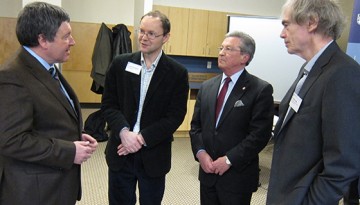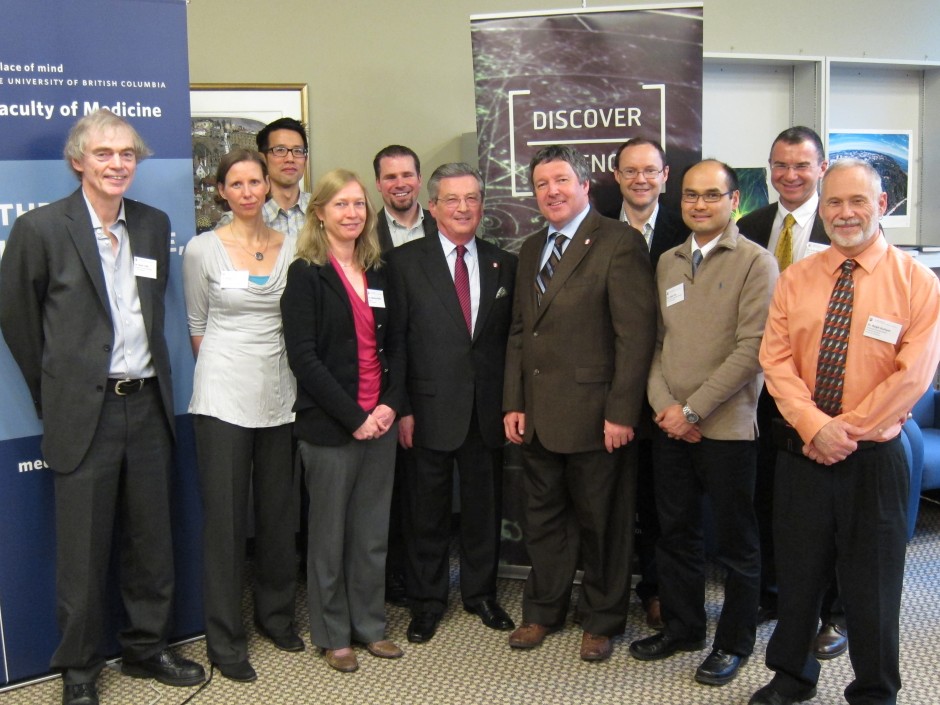The Cancer Research Society (CRS) has awarded $717,245 in new grants to six Faculty of Medicine researchers to enhance understanding of the mechanisms responsible for the development of cancer, the means of controlling different types of cancer, improve treatments and the quality of life of patients.
The grants, among 42 awarded nationwide by the CRS, were announced by the organization’s Executive Director, Andy Chabot, and its Scientific Director, Dr. Mario Chevrette, at a ceremony at UBC’s Life Sciences Centre Jan. 24.
“This year, thanks to generous donors from across the country, the Cancer Research Society’s Board of directors approved $10.6 million in grants to Canadian scientists,” said Andy Chabot, the Cancer Research Society’s Executive Director. “The 42 selected research projects are the most likely to contribute to the advancement of cancer research over the coming years.”
“The University of British Columbia has made cancer prevention, diagnosis, and treatment one of its core research goals in the health sciences, and that commitment has already led to some breakthrough discoveries by our scientists,” said Dr. Gavin Stuart, Dean of the Faculty of Medicine and UBC’s Vice Provost Health. “This new funding from the Cancer Research Society will enable us to build on that expertise, and apply our insights to patient care in direct, tangible ways.”
“I would like to emphasize the excellence of the researchers of the University of British Columbia and its affiliates,” said Dr. Robert Nabi, a member of the Cancer Research Society’s Board of directors, the president of its scientific committee, and a Professor in the Department of Cellular and Physiological Sciences. “Since 2008, they obtained more than 11 per cent, or $2.5 million, of all the grants awarded by the Cancer Research Society, supporting 21 research projects.”
The grants were awarded to:
- Ralph Buttyan and Ladan Fazli (Department of Urologic Sciences), to explore two genes that confer hormone resistance and metastatic properties to prostate cancer cells;
- Pieter Cullis (Department of Biochemistry and Molecular Biology), to continue research into next-generation lipid nanoparticle chemotherapy delivery systems;
- David Huntsman (Department of Pathology and Laboratory Medicine), to study the clinical outcomes and quality of life resulting from prophylactic gastrectomies;
- James Johnson (Department of Cellular and Physiological Sciences), to investigate the effect of insulin on pancreatic cancer cells;
- Catherine Pallen (Department of Pediatrics and Department of Pathology and Laboratory Medicine), to find out if a particular complex of molecules is responsible for the spread of breast cancer and a childhood cancer, rhabdomyosarcoma.

L-R: Dr. Mario Chevrette, CRS Scientific Director; Dr David Huntsman, Professor in the Department of Pathology and Laboratory Medicine; Andy Chabot, CRS Executive Director; Pieter Cullis, Professor in the Department of Biochemistry and Molecular Biology. Photo: Brian Kladko
The Cancer Research Society also announced the launching of a new funding initiative in 2013. Called the Scholarship for the next generation, the program will provide $2.4 million over the next five years for up to 15 young scientists, to launch their career in cancer research.
According to recent data from Statistics Canada, cancer has been the leading cause of death in Canada since 2005, and approximately 186,400 new cases and 75,700 deaths were expected in the country in 2012. Based on current incidence rates, nearly one in two Canadians will develop cancer during his/her lifetime.
Founded in 1945, the Cancer Research Society is a national not-for-profit organization whose sole mission is to fund cancer research on all types of cancer, thereby contributing to the advancement of science aimed at preventing, detecting, and treating cancer. During the past 20 years, the Cancer Research Society has granted over $100 million to about 900 cancer research projects across the country, including more than $39.5 million dollars over the past five years.
